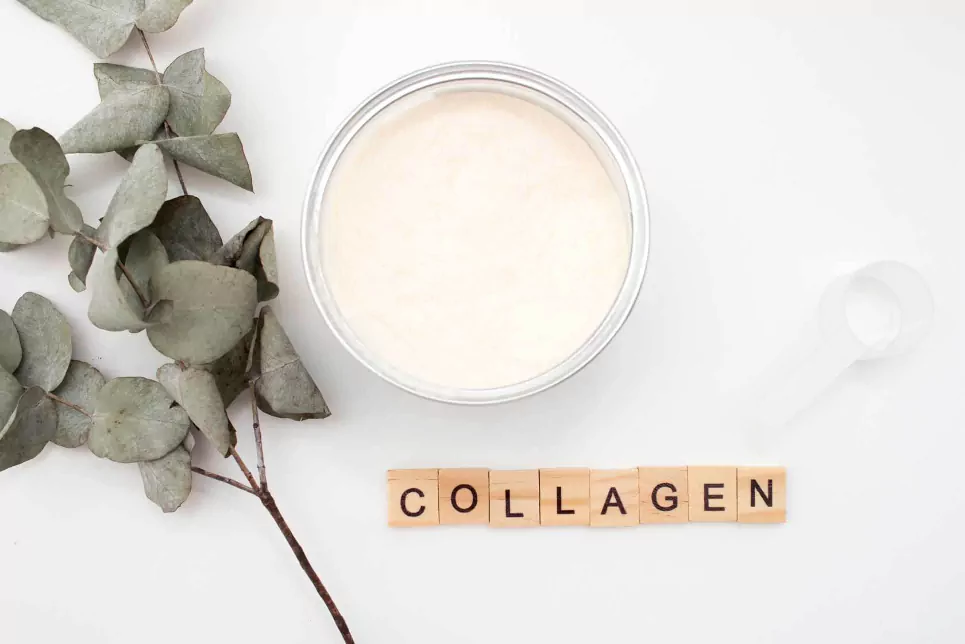Does Collagen Help with Acne? Unveiling the Truth

Key Takeaways
Does collagen help with acne:- Skin Health: Collagen supports skin structure, strength, and hydration, helping to maintain overall skin health.
- Wound Healing: Enhanced collagen production promotes the healing of acne scars, leading to smoother skin.
- Anti-Inflammatory: Collagen's anti-inflammatory properties can reduce redness and swelling associated with acne.
- Hydration and Sebum Regulation: Collagen helps maintain skin hydration and may regulate sebum production, reducing acne breakouts.
Article by Arnie Gitomer Sep 20, 2024
Does Collagen Help with Acne? Exploring the Science Behind the Claims
Collagen supplements have surged in popularity, hailed for their potential benefits to skin health. However, does collagen truly help with acne? This article explores the scientific research behind collagen and its effects on acne.
We will explore how collagen works in the skin, its role in healing and inflammation, and whether it can genuinely reduce acne and enhance skin health. At Willner Chemists, we are committed to providing top-tier health products, including high-quality collagen supplements that support skin health.
Understanding Collagen: The Skin's Structural Protein
Collagen is the most abundant protein in the human body. It forms the primary structural component of connective tissues, including the skin. It provides skin with strength, elasticity, and hydration. Collagen is known for its anti-inflammatory properties, which can help reduce the redness and swelling associated with acne.
Natural collagen production decreases as we age, leading to wrinkles and sagging skin. This reduction in collagen can also impair the skin’s ability to heal, potentially exacerbating acne issues.
Collagen and Wound Healing
Collagen plays a crucial role in wound healing by promoting the regeneration of new tissue. Acne lesions are small wounds on the skin, and adequate collagen levels are necessary for these wounds to heal properly. Enhanced collagen production can accelerate the healing process of acne scars, resulting in smoother skin.
What is Acne? Understanding the Basics
Acne is a skin condition characterized by inflammation and the formation of pimples, blackheads, and cysts. Inflammation plays a significant role in acne development and persistence.
When pores become clogged, the body's immune system sends white blood cells to fight the bacteria, leading to redness and swelling. This inflammatory response can make acne lesions more noticeable and painful, and in severe cases, it can lead to scarring.
Scientific Research on Collagen and Acne
Several studies have explored collagen's potential benefits for skin health, including its effects on acne. However, the direct link between collagen supplementation and acne reduction is still under investigation.
Collagen helps maintain the skin’s hydration levels and strengthens the skin barrier. A robust skin barrier protects against environmental stressors and prevents moisture loss. Well-hydrated skin can better resist acne-causing bacteria and reduce the occurrence of breakouts.
Sebum is an oily substance produced by sebaceous glands, and excessive sebum production is a major factor in acne development. Some studies suggest that collagen can help regulate sebum production, reducing the likelihood of clogged pores and acne formation.
Can Collagen Supplements Reduce Acne?
While the research is promising, it is essential to manage expectations. Collagen supplements can support overall skin health, which may indirectly contribute to a reduction in acne. However, they are not a standalone cure for acne. A holistic approach, including a balanced diet, proper skincare routine, and possibly other acne treatments, is necessary for the best results.
When selecting a collagen supplement, choose a high-quality product that is easily absorbed by the body. One such product is the Collagen Form + Adv 1, available from Willner Chemists. This supplement is designed to support skin health and overall well-being.
Incorporating Collagen into Your Skincare Routine
To maximize the benefits of collagen for your skin, consider incorporating both dietary and topical collagen. Here are a few tips:
Dietary Collagen
- Collagen Supplements Choose a reputable collagen supplement and follow the recommended dosage.
- Bone Broth Rich in natural collagen, bone broth can be a nourishing addition to your diet.
- Vitamin C Ensure adequate vitamin C intake, which is essential for collagen synthesis.
Topical Collagen
- Collagen-Infused Skincare Products: Use serums and creams that contain collagen to target the skin directly.
- Hydrating Ingredients: Look for products with hyaluronic acid and glycerin to boost hydration alongside collagen.
To Wrap it Up
Collagen can help reduce acne symptoms by being supportive in enhancing skin health. Its anti-inflammatory properties and ability to promote wound healing benefit acne-prone skin.
However, collagen should be part of a comprehensive skincare regimen rather than a sole solution. Combining collagen supplementation with a balanced diet, proper skin care, and other acne treatments will provide the best results for clear, healthy skin.
 |
Read more about Arnie Gitomer |
